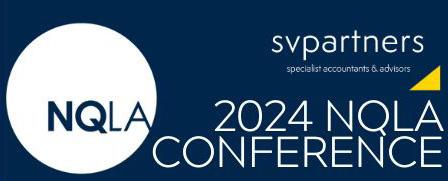TO SBR OR NOT TO SBR? IS IT THE BEST OR RIGHT OPTION?
Daniel Luckman - Associate Director | Sunshine Coast

It might come as a surprise that restructuring a trading business requires changes, sometimes uncomfortable changes. We all know that if you continue to do the same thing, you can expect the same result; but sometimes in practice we forget this principle.
Whilst you can utilise a Small Business Restructure (SBR) to compromise debts owed by a company, if the intention is to continue trading the business, the primary concern should be to determine whether the business is viable and can make money, not the percentage of legacy debts that can be reduced through undertaking an SBR (although this is a potential benefit).
So, what are some of the key business factors you should be reviewing to ensure your business is viable?
1. Profitability – assessing profitability goes right to the heart of why you should be in business. Whilst we might love what we do, if we don’t make money, it isn’t viable and cannot continue (unless you fund it personally – and that usually only goes so far!). This should involve reviewing revenue streams and opportunities (including potentially increasing pricing) and expenses (including a hard look at any expenses that can be cut or reduced).
2. Cashflow – an accurate cashflow is vital to ensuring you have sufficient funds available to pay debts when they need to be paid.
3. Capital Expenditure – do you have ageing assets that need to be replaced? Are any assets inefficient, costly to maintain or no longer safe for use? Have you planned for future capital expenditure and the replacement of assets when they are likely to be needed?
4. Staffing – Do you have too many employees? Do you need more staff? Have you thought about contingency plans if a key employee decides to leave? Retaining staff (including appropriately qualified employees) is integral to having a viable business.
5. External factors – have you thought about other business factors that are outside of your control and what impact these might have on your business? What are you doing to minimise these risks where possible?
Your accountant or business advisor will be able to guide you to look under the hood of your business and assess what opportunities might exist to improve its viability.
Since their introduction, SBRs have been well received by stakeholders (including the ATO) to restructure businesses in a cost-effective manner and reduce unmanageable legacy debts of companies. In the latest available statistics, 92% of SBRs that were put forward to affected creditors were accepted and the ATO was a major creditor in the vast majority of these matters.
If you or your client are considering whether to undertake an SBR, we encourage you to reach out to your local SV Partners’ office to see whether a restructure is the right option for you.
IN THIS ISSUE
To SBR or not to SBR? Is it the Best or Right Option?

Is a Court Liquidation the End of a Company?
Now is the Time to Consider a Members Voluntary Liquidation
Cashflow
Might be King but is it Sinking Your Business?
Scan to read more articles
ISSUE 43 MARCH 2024 COLLEAGUES THE OFFICIAL SV PARTNERS NEWSLETTER
801
svpartners.com.au 1800 246
Liability limited by a scheme approved under Professional Standards Legislation
IS A COURT LIQUIDATION THE END OF A COMPANY?
Stuart Starr - Associate Director | Adelaide

On several occasions we have been appointed by the Court as Liquidators to companies only to find that they are still trading businesses. In some circumstances, the underlying business is profitable and viable, but had experienced a "black swan” event which the company struggled to overcome.
Whilst the Directors of these companies would have been better off seeking advice on their options and appointing Voluntary Administrators some time earlier, the appointment of Liquidators by the Court does not preclude this from occurring.
Under section 436B of the Corporations Act 2001 (Act), a Liquidator can appoint a Voluntary Administrator for the purposes of allowing the Directors to propose a Deed of Company Arrangement.
The Act provides that, with leave of the Court or by a resolution of creditors, the Liquidators can appoint themselves as the Voluntary Administrators. An application to Court is more often the approach taken as orders can be sought:
• Staying the liquidation whilst the voluntary administration process is undertaken;
• Dispensing with the need to convene a first meeting of creditors.
Liquidators will only consider appointing a Voluntary Administrator once they have made some preliminary assessments of the company to which they are appointed. In particular, they would seek to collate the following information which a Court would consider in such applications. Some of these factors include:
• Causes of insolvency
• Any misfeasance by Directors/recovery actions
• Profitability and financial position
• The terms of the proposed Deed of Company Arrangement
• Better outcome for creditors/stakeholders
As such, by the time this information is gathered and reviewed, the Liquidators are familiar with the company’s affairs, and it is beneficial to creditors to have the Liquidators act as Voluntary Administrators. Arguably, as they were appointed by the Court, the Liquidators are also independent and do not have any alliance with the company’s Directors or the petitioning creditor.
In two recent matters, we were successful in our applications to Court on each occasion and creditors subsequently accepted the proposed Deed of Company Arrangement in each case, with control of the companies returned to their Directors. A further Court application is required to terminate the winding up of the company upon the acceptance of the Deed of Company Arrangement.
Whilst each of these circumstances meant that Court Liquidation was not the end for these companies, there were significantly greater costs incurred in making such applications once the winding up order had been made.
Such costs could have been avoided, with the same outcome but a greater return to creditors, if the respective Directors had sought earlier advice and appointed Voluntary Administrators themselves well prior to court liquidation hearings.
If you have clients with viable businesses that are under pressure from creditors resulting from a “black swan” event (such as COVID), please encourage them to reach out to their local SV Partners’ office for early and appropriate advice.




SV PARTNERS PAGE 2 Scan to continue reading
Follow Us svpartners.com.au | 1800 246 801 Liability limited by a scheme approved under Professional Standards Legislation
NOW IS THE TIME TO CONSIDER A MEMBERS VOLUNTARY LIQUIDATION
Alan Scott and Travis Olsen - Directors | Adelaide

With only a further 3 months until the end of the financial year, now is the perfect time to plan the Members Voluntary Liquidation (MVL) of solvent companies your clients may no longer need.
Why Commence MVL on 30 June?
By commencing the MVL on 30 June 2024, you should only need to prepare an electronic final tax return for the year ended 30 June 2024. This creates efficiencies to the distribution process as upon electronic lodgement, a tax clearance can be requested immediately.
If the MVL commences during the year, a part year final tax return must be lodged, which can only be prepared using a paper form. This results in the ATO having to manually input the information and may add additional time (approximately eight weeks but could be more depending on the ATO’s workload) to process.
When an MVL is Effective
An MVL may be used where:
• there is a need to simplify a group structure or where a company is no longer required or has achieved its purpose;
• the shareholders no longer wish to be in business together or want access to any entitlements they may have (e.g. a family company);
• the shareholders want certainty. A Liquidator will advertise for creditors’ claims which must be received within the notice period and before assets are distributed to be paid otherwise such claims cannot be pursued at a later stage;
• the shareholders wish to take advantage of various tax treatments of the different reserves; or
• assets may be distributed in-specie potentially saving on stamp duty.
Timing and Quote
Planning of an MVL can take several weeks especially where specialist tax advice is required. Accordingly, we recommend that you make contact as soon as possible so that suitable documents can be provided and any necessary tax advice can be obtained.
We have extensive experience in MVLs and can provide a cost estimate if we are provided with the following documents:
• Company’s Constitution or Memorandum and Articles of Association; and
• The most recently prepared balance sheet.
Alternatively, please contact us to discuss your client’s particular situation so that a tailored solution can be provided. Note that our cost estimates are usually on a fixed fee basis so that clients are certain of the costs involved in the process.
Further Information
If you would like further information regarding the process of liquidating solvent companies, you may refer to the Members Voluntary Liquidation information on our website at svpartners.com.au.
To find out more or if you wish to obtain a cost estimate, please contact your local SV Partners’ office on 1800 246 801.
PAGE 3 SV PARTNERS
Liability limited by a scheme approved under Professional Standards Legislation
RESTRUCTURING ANYONE? CASHFLOW MIGHT BE KING BUT IS IT SINKING YOUR BUSINESS?
Michael Brennan - Director | Townsville
One of the only certainties in these uncertain times, is the need for business owners to have complete oversight of their cashflow like never before.
Cashflow and budgeting forecasts are critical to understanding the current position of your business, its viability, attracting creditor agreement and identifying options to maximise business sustainability through the allocation of possible financial buffers.
As the threats to business from rising inputs continue, understanding the cashflow of your operation has never been more important.
A cashflow will allow you to take stock of where your financial challenges lie, the extent of disruption, higher operating costs and lost revenues.
By taking decisive action today, you can ensure your business remains agile and as prepared as it can be in this rapidly changing business environment.
A transparent cashflow will help you to identify if your business has enough money to survive the next three, six, twelve and eighteen months of operation. Once a cashflow has been completed, you can then identify cash preservation measures and available credit facilities.
2024 SV PARTNERS NORTH QUEENSLAND LAW ASSOCIATION CONFERENCE
SV Partners is proud to be the Naming Rights Sponsor for this year's NQLA Conference.
This event brings together legal professionals from across Australia for a unique experience featuring Continuing Professional Development sessions and engaging social activities.
Esteemed speakers from the legal sector will share their insights at The Ville Resort-Casino in Townsville from May 24th to May 25th, 2024.


While this may all seem obvious, surprisingly it isn’t. Many business owners who had positive cash flow in the past, didn’t always have the need to stress-test their business position in a way that they might require today.
In the current unpredictable climate, a better understanding of actionable insights and where and how you can quickly free up cash in your business is essential to its longevity.
That’s where an accurate cashflow can help to ensure your business has the best shot of being sustainable long into the future. It will support you to identify and weigh up various scenarios and respond more proactively to the many challenges that are arising from a volatile economic landscape.
A professional cashflow can also help you to identify ‘quick wins’ within the business to free up finances, assets that may be able to be divested and structural changes that may be required to refocus your efforts.
Acting decisively and with full oversight is going to be critical for many businesses if they are to come out the other side of this latest challenge with the doors still open.

CONGRATULATIONS BRETT!

Congratulations to Brett Harron from our Gold Coast office on his completion of the ARITA Advanced Certification course. Brett also obtained the highest mark nationally in the Fundamentals of Restructuring Insolvency and Turnaround course. Scan
CONGRATULATIONS BRIANNA!

We would like to congratulate Brianna Wolski from our Brisbane office on her successful appointment to the WIRQ (Women in Insolvency and Restructuring Queensland) Committee for 2024.
SV PARTNERS PAGE 4
to learn more
Liability limited by a scheme approved under Professional Standards Legislation













